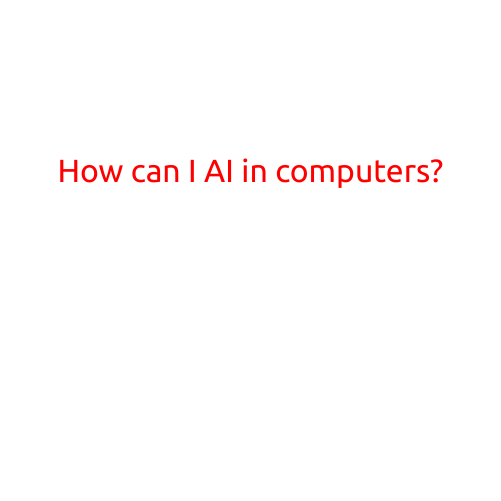
How Can I Learn About AI in Computers?
Artificial Intelligence (AI) has taken the world by storm, transforming the way we live, work, and interact with technology. With AI capabilities being implemented in various industries, from healthcare and finance to customer service and gaming, it’s no wonder why many are eager to learn more about this fascinating field. In this article, we’ll explore the basics of AI in computers and provide a step-by-step guide on how to get started.
What is AI in Computers?
AI in computers refers to the development of hardware and software systems that can perform tasks that typically require human intelligence, such as:
- Learning: AI systems can learn from data and adapt to new information.
- Problem-solving: AI can solve complex problems and make decisions.
- Reasoning: AI systems can draw conclusions based on data and rules.
- Perception: AI can interpret and understand data from sensors, such as images and speech.
Why Learn About AI in Computers?
There are numerous reasons why learning about AI in computers is a valuable pursuit:
- Job Opportunities: As AI becomes more widespread, there is a growing demand for professionals with AI skills.
- Career Advancement: Staying up-to-date with AI developments can enhance your career prospects and open up new opportunities.
- Personal Projects: With the ability to learn and adapt, AI can be applied to various personal projects, such as chatbots, game development, and more.
- Improve Decision-Making: AI can help make informed decisions by analyzing large amounts of data and identifying patterns.
Getting Started with AI in Computers
To learn about AI in computers, you can follow these steps:
- Understand the Basics: Start by learning the fundamentals of programming languages such as Python, Java, or C++. Online resources like Codecademy, Coursera, and edX offer courses on programming.
- Learn Math and Statistics: AI relies heavily on mathematical concepts, so it’s essential to have a solid understanding of linear algebra, calculus, and probability.
- Explore AI Frameworks: Familiarize yourself with popular AI frameworks like TensorFlow, Keras, or PyTorch. These frameworks provide pre-built functions and tools for building AI models.
- Practice with Tutorials and Projects: Start with beginner-friendly tutorials and projects on websites like Kaggle, GitHub, or Medium. Practice building AI models and experimenting with different algorithms.
- Join Online Communities: Participate in online forums, such as Reddit’s r/MachineLearning and r/ArtificialIntelligence, to stay updated on the latest developments and connect with fellow AI enthusiasts.
- Take Online Courses: Enroll in courses on AI-specific topics, such as Natural Language Processing, Computer Vision, or Reinforcement Learning.
Additional Resources
- Books: “Python Machine Learning” by Sebastian Raschka, “Deep Learning” by Ian Goodfellow, Yoshua Bengio, and Aaron Courville
- Conferences: Attend conferences like NIPS, ICML, and IJCAI to learn from industry experts and network with peers
- Podcasts: Listen to podcasts like “AI in Industry” and “The AI Alignment Podcast” for insights into AI applications and challenges
Conclusion
Learning about AI in computers requires a combination of programming skills, mathematical knowledge, and exposure to AI frameworks and tools. With persistence and dedication, you can develop a solid foundation in AI and unlock new opportunities in this exciting field. Remember to stay updated with the latest developments, practice regularly, and join online communities to stay connected with other AI enthusiasts.





